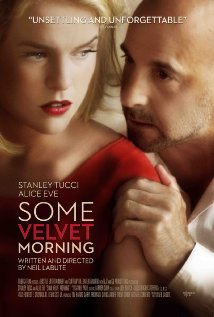
SOME VELVET MORNING
US, 2013, 88 minutes, Colour.
Stanley Tucci, Alice Eve.
Directed by Neil La Bute.
Writer-director, Neal La Bute, had a strong reputation in theatre, which continues, before his first scarifying film dramatising macho attitudes, In the Company of Men (1997), which was followed by Your Friends and Neighbors. La Bute has made many short films and written for television series, but also branched out into broader narratives like Possession, The Wicker Man, Nurse Betty.
This film is two-hander, played expertly by Stanley Tucci, reminding audiences of how versatile an actor he is, and English Alice Eve (who appears in the director’s Dirty Weekend). She uses her British accent in the film.
The location is a suburban house, an interior, downstairs room, staircase and upstairs room and bathroom. Some moments the camera goes outside the house, most especially in an outside garden patio.
The basic plot is that a middle-aged man leaves his wife, arrives at the doorstep of his mistress intending to move in. While she welcomes him, she is taken aback at his decision. A further irony is that she is in a relationship with the man’s married son. The dialogue goes back and forth, changing moods with each of the characters, eliciting some dramatic interactions.
There is a need to warn audiences that there is a significant twist at the end of the film which makes a difference and it would be better not to know anything and to discover the twist at the end which gives the audience much to reflect on the film in retrospect.
1. The impact of the film, drama, personal interaction?
2. The dialogue, the two-hander, locations within the house, rooms, upstairs, on the outside garden? Musical score?
3. The work of the director, his works in the theatre, his screenplays, his sense of staging, drama, action confined to the house? The effect? Like watching a play – or like watching a television drama?
4. The title, the song? The nickname for the woman?
5. The importance of seeing the film without knowing the final twist? Taking the drama as realistic? Discovering that it was realistic only in style?
6. Velvet, lying down during the credits, on the bed, her red dress, listening to the music, the doorbell, opening the door, discovering Fred with his suitcases, her handling of the situation, surprise, the gradual revelation of the past relationship, after four years? Her reaction to his leaving his wife? Her relationship with his son, ongoing, despite his marriage? The interactions, her wanting to go out, getting ready? Fred and his impositions? The glass of water, going out into the garden, on the seat? A sense of humour, yet his sense of realism? A sense of uneasiness? Going upstairs, make up, ready to go out? The phone call? Chris, sitting on the steps and Fred hearing? The build-up of the interactions, Fred and his moods, his leaving his wife, wanting to stay with Velvet, seeing this was not possible? The build-up in emotional interactions, the sexual encounter, her tear in the aftermath?
7. Fred, arriving at the door, leaving his wife, with his luggage, coming in, wanting to stay, his response to Velvet? Their past relationship? Her suggestion that he ring his wife? The discovery that Velvet was still in relationship with his son? Going outside, the glass of water, the talk, returning inside, the confrontations, his moods going up and down, the revelation of himself, his demands, his seeming frustration, the puzzles? Listening to Velvet on the phone, the build-up to the sexual encounter? His dominance?
8. The discovery of the truth, the role play, realising the significance of the actions in retrospect? Velvet as a call girl, the games that she and Fred played,
the plans for next time? His concern about the episode being too rough, the payment of the extra, the plans to come again?
9. The effect for Fred, sexual encounter, sexual release, the importance of role play? The effect on Velvet, alone again?